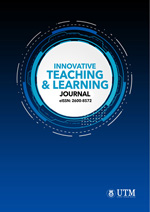Exploring Cognitive Engagement in Extreme e-Service Learning for Multimedia Creative Course During the COVID-19 Pandemic
DOI:
https://doi.org/10.11113/itlj.v8.154Keywords:
student engagement, cognitive engagement, e-service learning, extreme e-service learning, online service learningAbstract
The COVID-19 pandemic prompted a global shift towards online learning, necessitated by restrictions on physical interaction. Consequently, Multimedia Creative Courses incorporating Service Learning were transformed into Extreme e-Service Learning (Xe-SL), conducted entirely online. In the realm of online e-Service Learning, ensuring student engagement and knowledge retention are crucial to successful course completion. While behavioural engagement can be easily observed, assessing cognitive engagement presents a challenge. Cognitive engagement involves the learner's psychological investment in the learning process, their willingness to comprehend the material, and their drive to attain the highest levels of understanding.This study explores the cognitive engagement of students in Extreme e-Service Learning (Xe-SL), an online learning approach implemented during the COVID-19 pandemic. A case study was conducted involving 27 undergraduate students undertaking a Multimedia Creative project within Xe-SL. Thematic analysis of collected reflections revealed distinct patterns of cognitive engagement across different phases. Prior to Xe-SL, students demonstrated cognitive engagement through understanding concepts, problem solving, critical thinking, self-reflection, and self-improvement. During Xe-SL, cognitive engagement was evident in the acquisition of new skills and tools, overcoming challenges, reflection, and recognizing the impact and benefits of their work. Post-Xe-SL, students exhibited increased skills and knowledge, engaged in teaching and mentorship, fostered collaboration and teamwork, applied problem-solving skills, and retained and applied their knowledge.These findings provide insights into the cognitive engagement processes within Xe-SL and offer practical guidance for designing effective online learning activities. Furthermore, the study highlights the enduring impact of Xe-SL on students' skills, collaboration abilities, problem-solving proficiency, and knowledge application. This research contributes to the understanding of effective online pedagogy and underscores the benefits of Xe-SL. Educators, instructional designers, and policymakers can leverage these findings to enhance student engagement and promote meaningful learning experiences in online service learning environments.

















